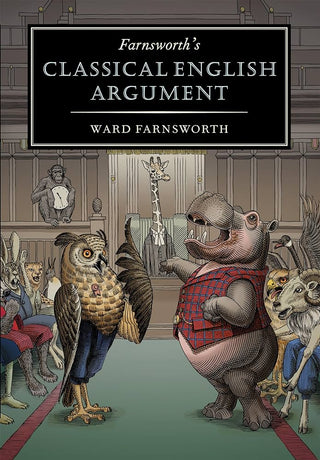Farnsworth's Classical English Argument
- Unit price
- / per
-
Author:FARNSWORTH Ward
-
ISBN:9781567927986
-
Publication Date:April 2024
-
Edition:1
-
Pages:264
-
Binding:Hardback
-
Publisher:David Godine Publishers
-
Country of Publication:USA


A Back Order button means that we don’t have the book in stock at our store. It may already be on order – or we can order it for you from a publisher or distributor at no additional cost.
As we source items from around the globe, a back-order can take anywhere from 5 days to several weeks to arrive, depending on the title.
To check how long this might take, you’re welcome to contact us and we can provide an ETA or any other information you need. We recommend checking the timeframe before committing to an online order.
Farnsworth's Classical English Argument
- Unit price
- / per
-
Author:FARNSWORTH Ward
-
ISBN:9781567927986
-
Publication Date:April 2024
-
Edition:1
-
Pages:264
-
Binding:Hardback
-
Publisher:David Godine Publishers
-
Country of Publication:USA
Description
Learn how to argue from the masters. This book is a complete course on the art of argument, taught by the greatest practitioners of it: Churchill, Lincoln, and hundreds of others from the golden age of debate in England and America.
The book's concise chapters provide lessons in all aspects of give and takethe syllogism and the slippery slope, the argumentum ad hominem and reductio ad absurdum, the fallacy and the insult. Ward Farnsworth shows how the full range of such techniques can be used or repelled, and illustrates them with examples that are fascinating, instructive, and fun to read.
The result is a browsable reference in which every page is a pleasure. It will leave you better able to win arguments and to defend yourself under fire. It's also an entertaining reminder that argument can be a source of beauty and delight. As Farnsworth says of the illustrations, they show talented advocates "crossing analytical swords and exchanging abuse when those things were done with more talent and dignity than is common today. They made argument a spectator sport of lasting value and interest."
Adding product to your cart
You may also like
A Back Order button means that we don’t have the book in stock at our store. It may already be on order – or we can order it for you from a publisher or distributor at no additional cost.
As we source items from around the globe, a back-order can take anywhere from 5 days to several weeks to arrive, depending on the title.
To check how long this might take, you’re welcome to contact us and we can provide an ETA or any other information you need. We recommend checking the timeframe before committing to an online order.
You may also like
You may also like
-
Learn how to argue from the masters. This book is a complete course on the art of argument, taught by the greatest practitioners of it: Churchill, Lincoln, and hundreds of others from the golden age of debate in England and America.
The book's concise chapters provide lessons in all aspects of give and takethe syllogism and the slippery slope, the argumentum ad hominem and reductio ad absurdum, the fallacy and the insult. Ward Farnsworth shows how the full range of such techniques can be used or repelled, and illustrates them with examples that are fascinating, instructive, and fun to read.
The result is a browsable reference in which every page is a pleasure. It will leave you better able to win arguments and to defend yourself under fire. It's also an entertaining reminder that argument can be a source of beauty and delight. As Farnsworth says of the illustrations, they show talented advocates "crossing analytical swords and exchanging abuse when those things were done with more talent and dignity than is common today. They made argument a spectator sport of lasting value and interest."
-
-
Author: FARNSWORTH WardISBN: 9781567927986Publication Date: April 2024Edition: 1Pages: 264Binding: HardbackPublisher: David Godine PublishersCountry of Publication: USA
Learn how to argue from the masters. This book is a complete course on the art of argument, taught by the greatest practitioners of it: Churchill, Lincoln, and hundreds of others from the golden age of debate in England and America.
The book's concise chapters provide lessons in all aspects of give and takethe syllogism and the slippery slope, the argumentum ad hominem and reductio ad absurdum, the fallacy and the insult. Ward Farnsworth shows how the full range of such techniques can be used or repelled, and illustrates them with examples that are fascinating, instructive, and fun to read.
The result is a browsable reference in which every page is a pleasure. It will leave you better able to win arguments and to defend yourself under fire. It's also an entertaining reminder that argument can be a source of beauty and delight. As Farnsworth says of the illustrations, they show talented advocates "crossing analytical swords and exchanging abuse when those things were done with more talent and dignity than is common today. They made argument a spectator sport of lasting value and interest."
-
Author: FARNSWORTH WardISBN: 9781567927986Publication Date: April 2024Edition: 1Pages: 264Binding: HardbackPublisher: David Godine PublishersCountry of Publication: USA
-



